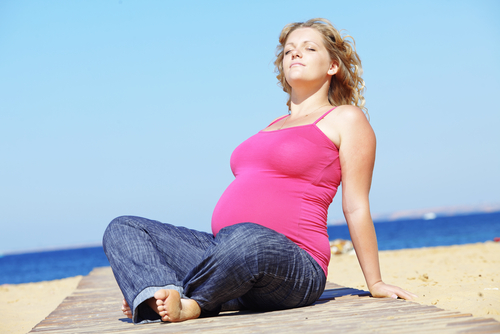Scottish mums-to-be are at greater risk of vitamin D deficiency than their more southerly sisters. This is probably an obvious observation as the best source of vitamin D is sunshine and in the UK, the further north you go, the less sunshine you'll be exposed to. In order to compensate for this, the equally obvious answer is to take more vitamin D supplements. Prof Paul Haggarty, and his team from the University of Aberdeen recommend that more should be done to improve the uptake of current advice on vitamin D supplements, but they also suggest that promoting safe sun exposure and access to green spaces in summer could be a useful additional strategy, even in the north of Scotland.
In a study that included 1205 pregnancies at Aberdeen Maternity Hospital between 2000 and 2006 the researchers aimed to determine vitamin D status in mothers and newborns in a large population in the northeast of Scotland (latitude 57° North). The team evaluated the influence of season, vitamin D intake from diet and supplements, compliance with current advice on supplement use, and the effect of vitamin deprivation.
The vitamin D analysis was carried out at the University of Glasgow and the team found that:
-
21% of the mothers in Aberdeen took vitamin D supplements during
 pregnancy; only 1% were taking the recommended amount.
pregnancy; only 1% were taking the recommended amount. - Mothers taking supplements had a higher level of vitamin D in their blood, but this did not show up in blood samples from the umbilical cord at the time of birth.
- There was a strong seasonal variation in the mother’s vitamin D level, with a much higher level from May to September.
- The levels of supplement use in Scotland were not very different from those previously reported for pregnant women in the south of England but the levels of vitamin D were lower in Scotland.
The further north you are, the more time in the sun (or dietary supplements) you need. However, there is also a cost element and the poorer you are, the less likely you are to buy expensive supplements, spend time sunbathing or go on sunny holidays. For whatever reason, women in the UK are clearly failing to follow current advice on vitamin D supplement use in pregnancy. This is leading to very low levels in some mothers and newborns, particularly in the winter months, and the problem is greatest in mothers from the poorest areas.
The human chlorophyll equivalent?
Prof Haggarty specialises in the role of vitamin D in pregnancy and an article from him for totalhealth will follow shortly. Interestingly, in the initial stages of pregnancy a lot of fat is stored up, which is then mobilised - releasing stored vitamin D during later pregnancy. Prof Haggarty will be explaining the further importance of this 'fat cycling' and the health implications of staying fat all the time.



